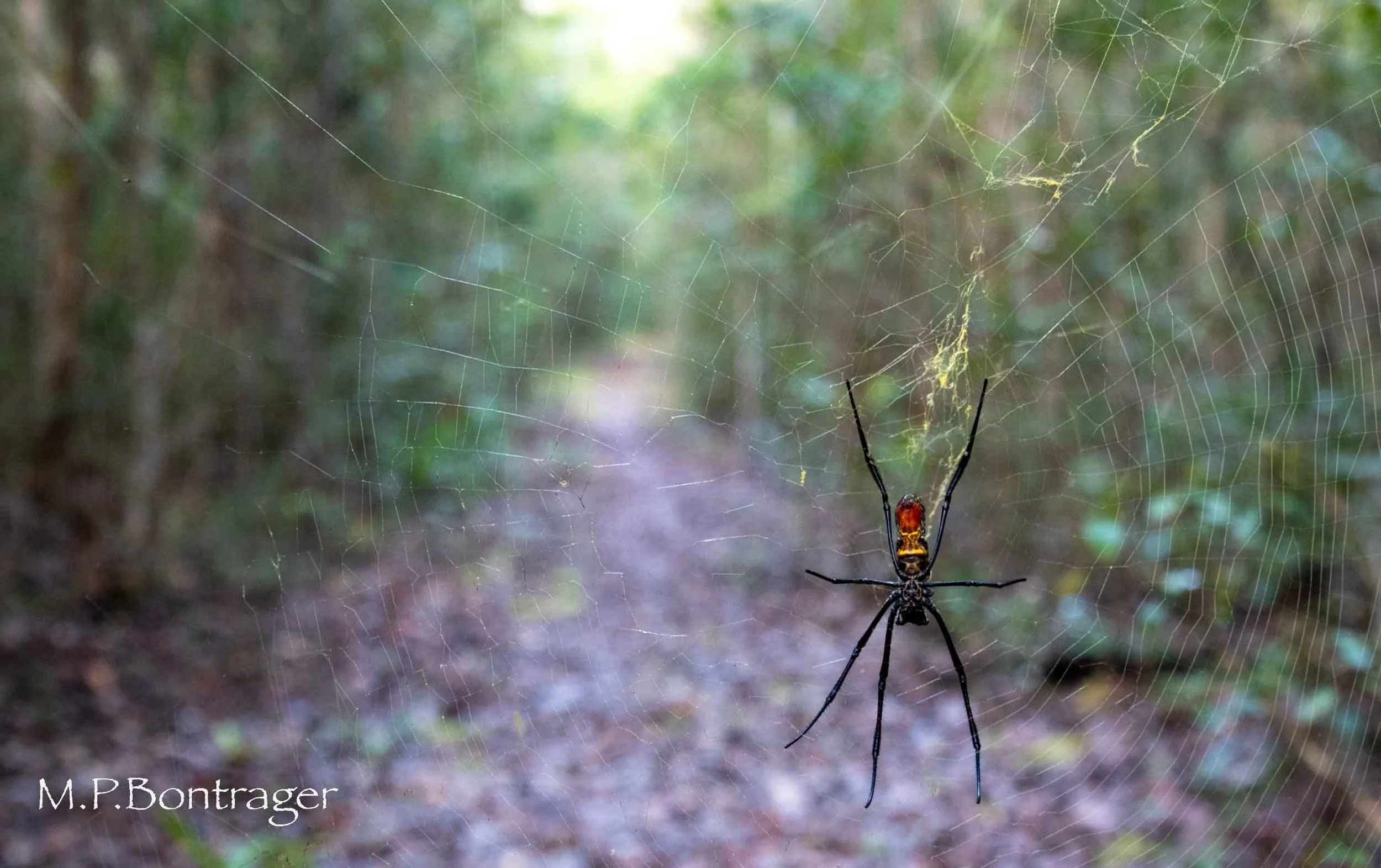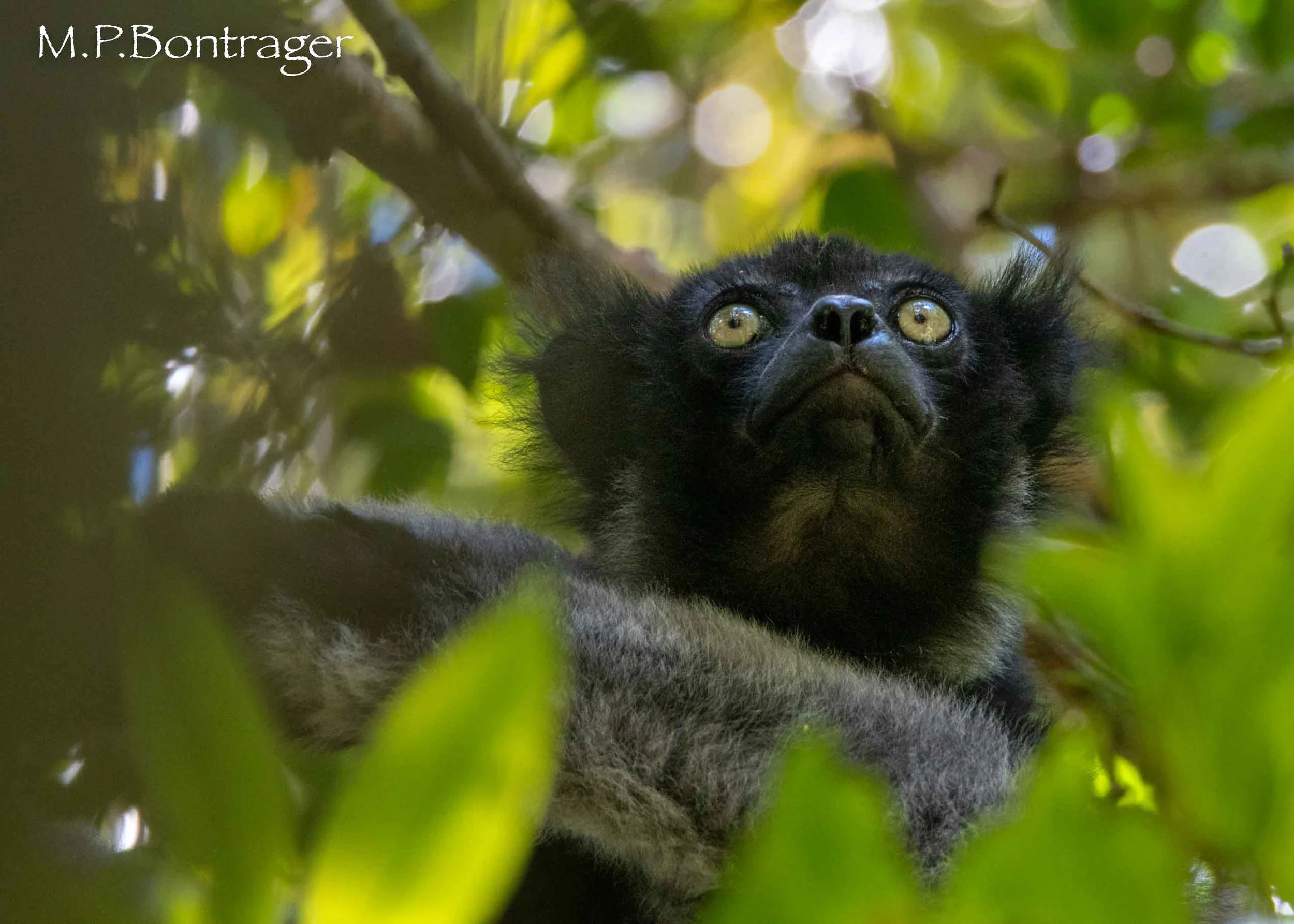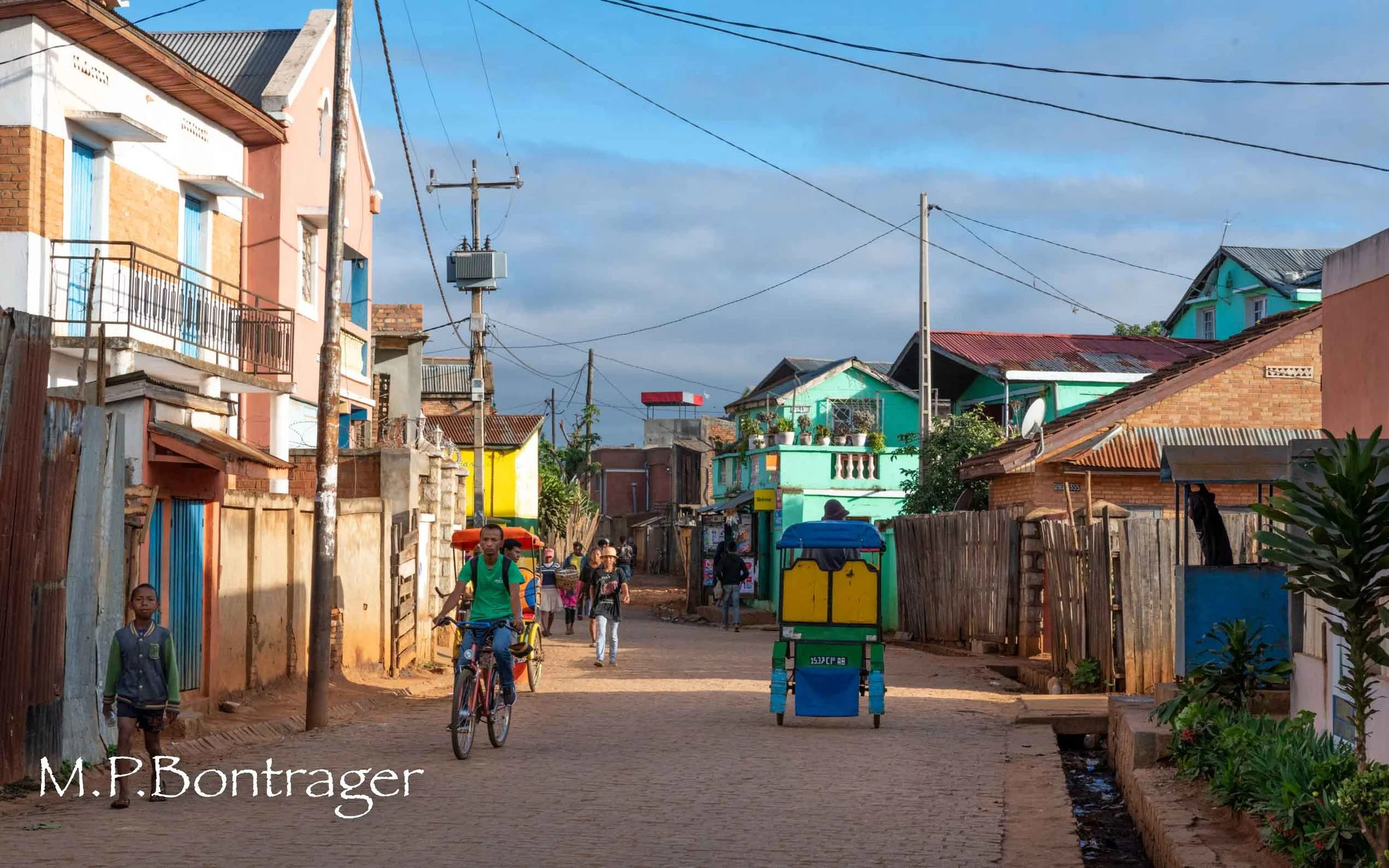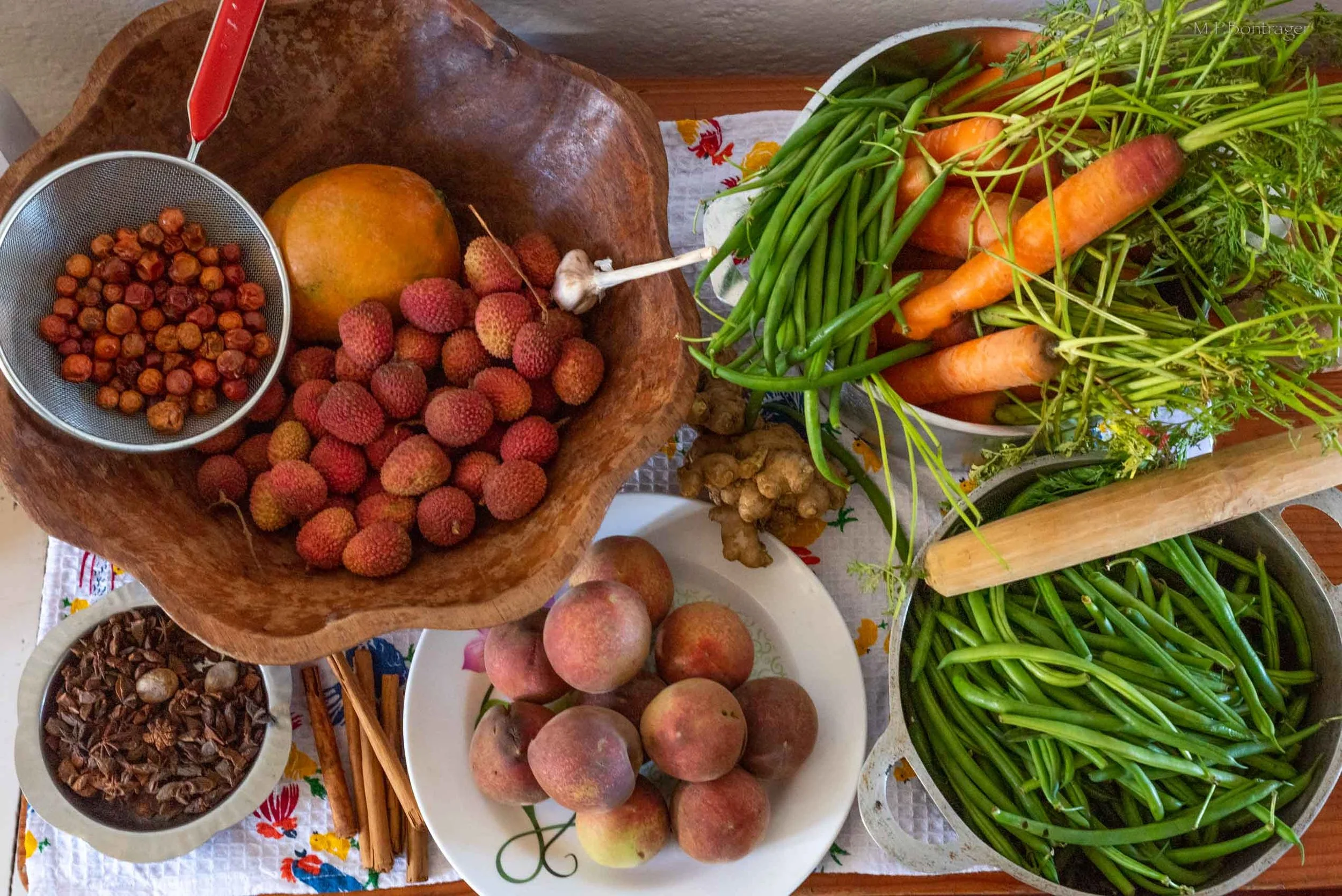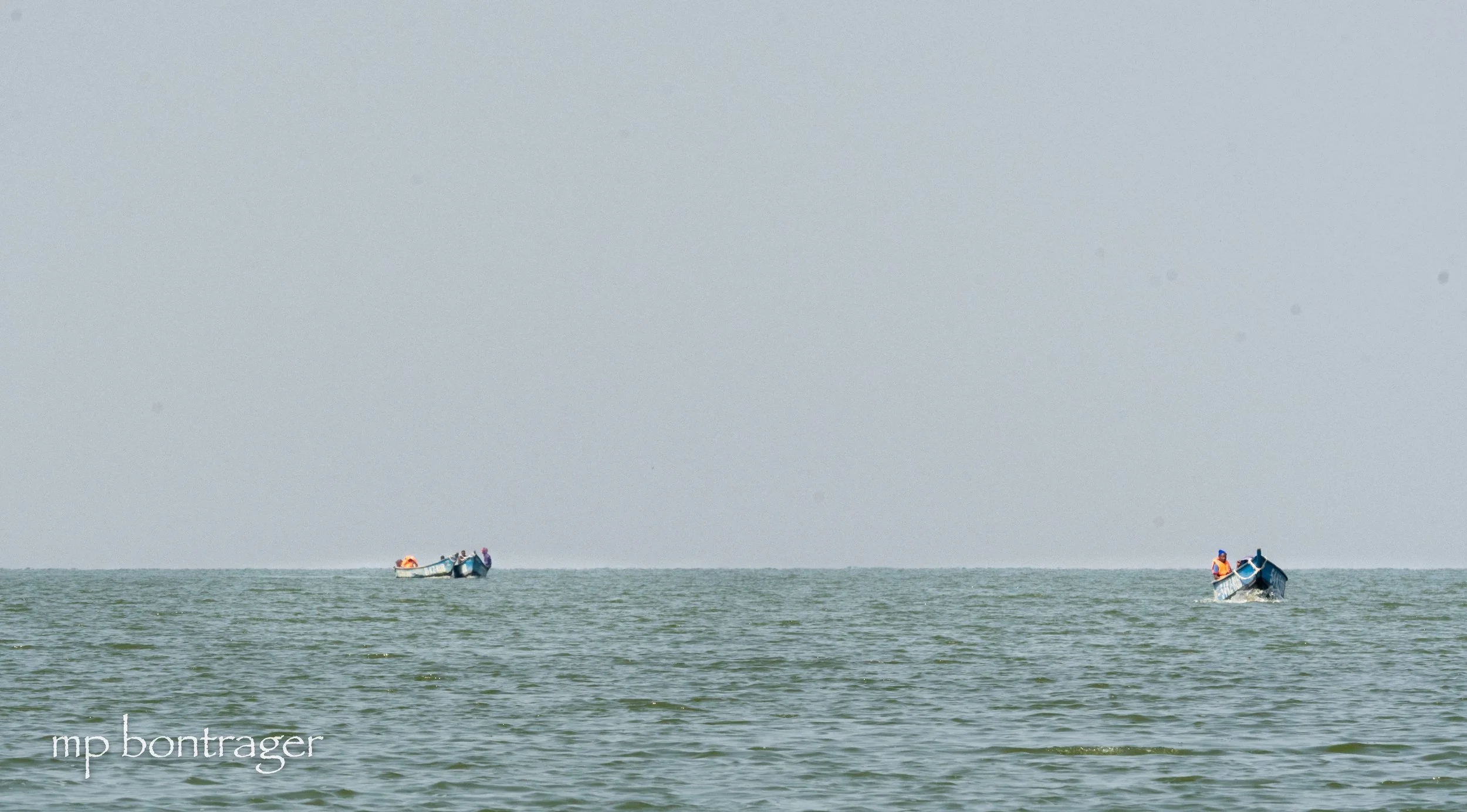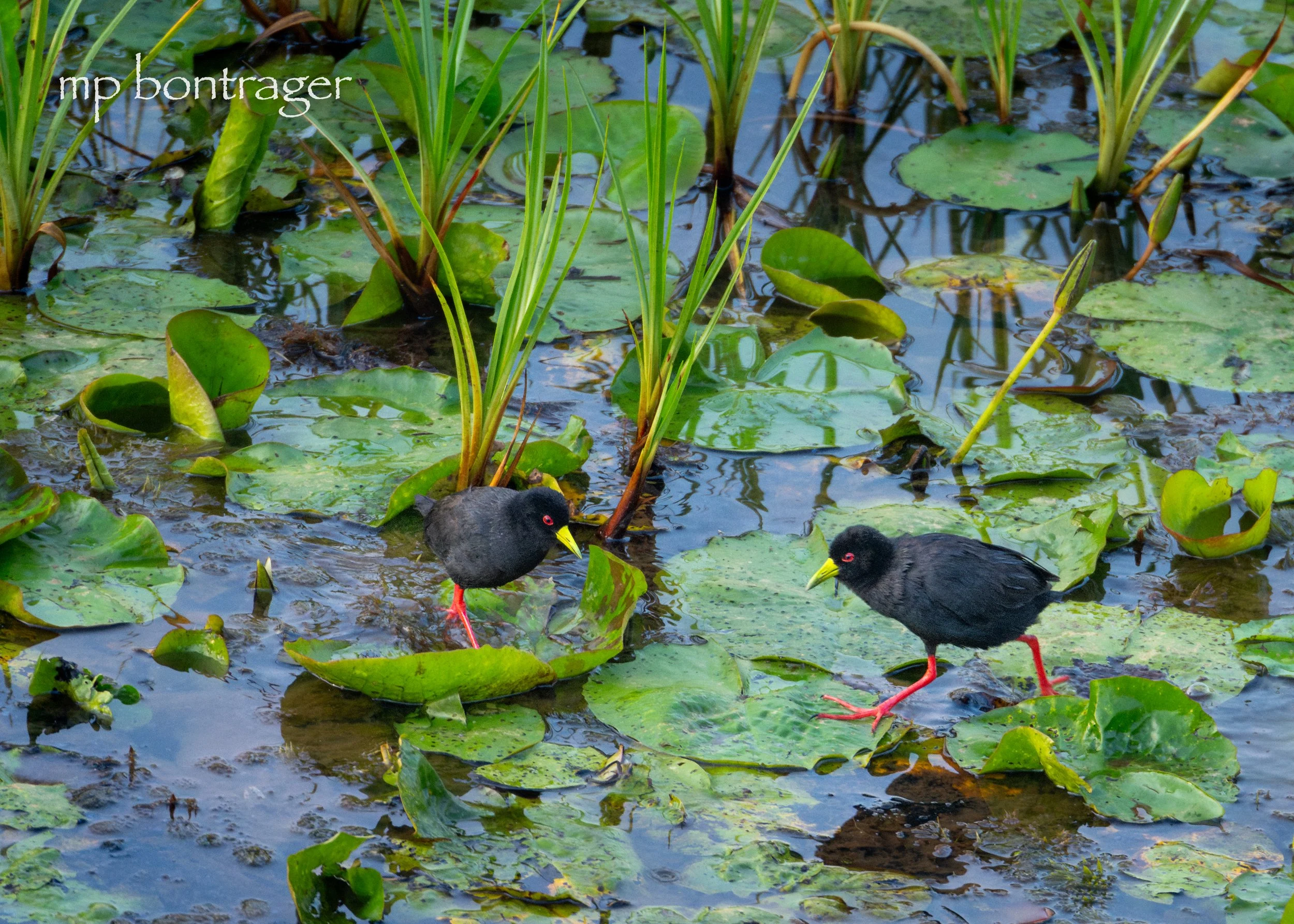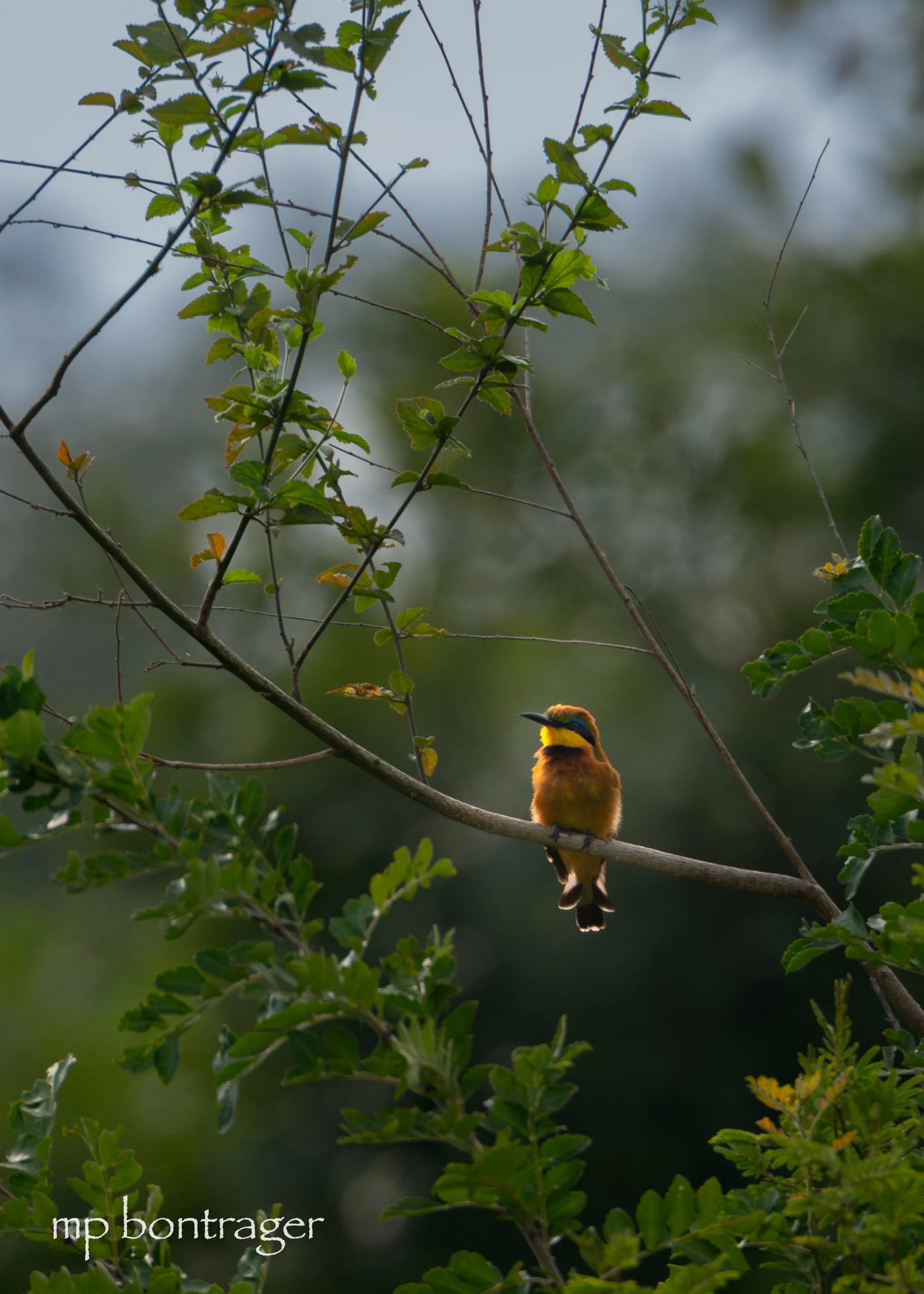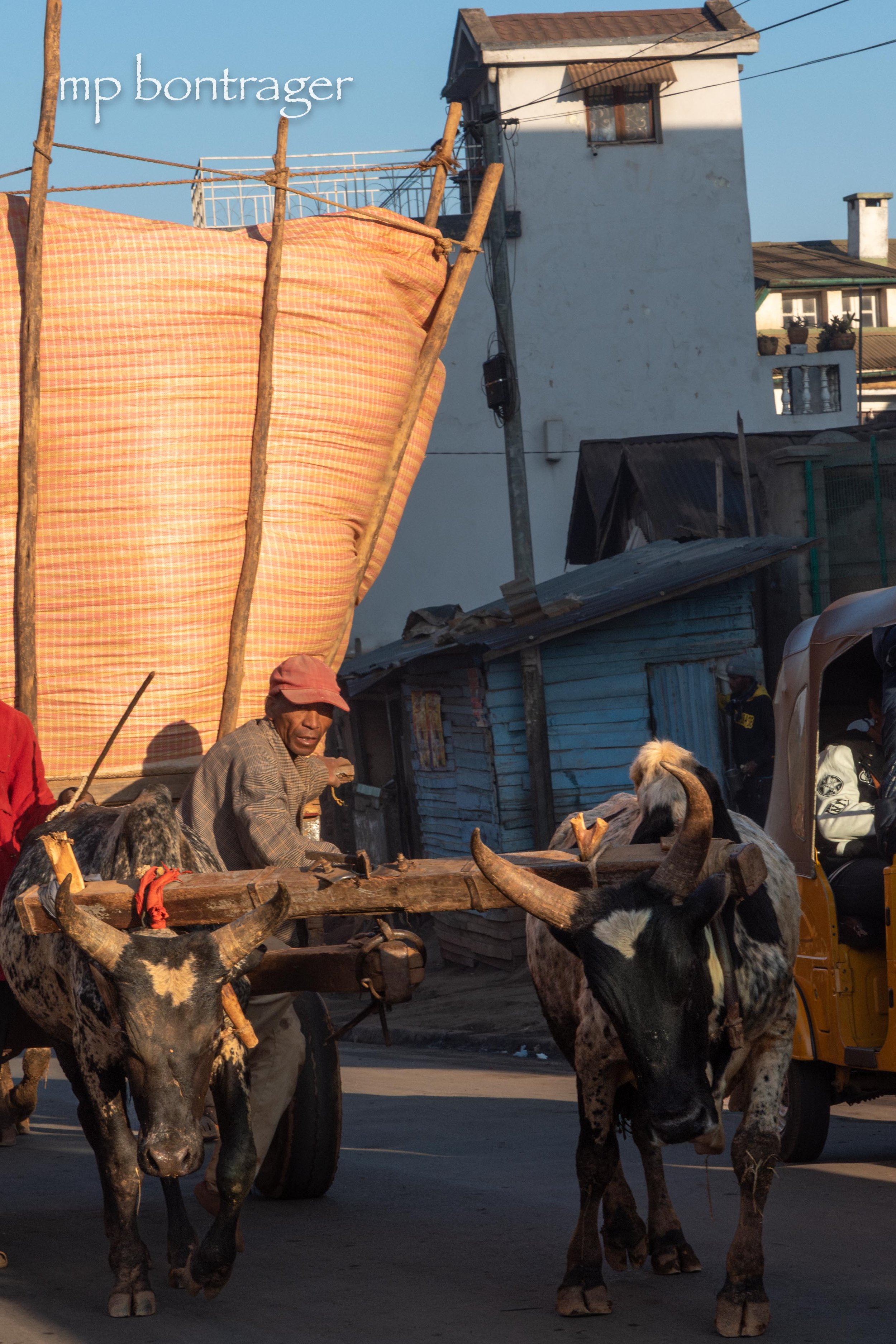I scream for help; no one comes. I quietly listen. The man seems to be alone. He doesn’t have tools and will be unable to break open the shutters or doors with his bare hands.
Read MoreA Walking Bird's Nest
Black and White Ruffed Lemur
Madagascar 2023
Everyone around me seems carefree and so light on their feet. Men and women greet each other on the street with a wave and a “inona vaovao?” We motor on to a newer forest that the community is reestablishing after the clear cut of yesterday. The forest already hosts an array of beautiful botanicals and wildlife though the canopy is very different than an old growth forest it offers hope for the future.
Birds fly high above us. Once in a while a curious one will land on a branch ahead just to peer down at us for a minute.
Up at 4:14
Hiking at 5:15
This is my ideal start to a day while on holiday
A lone brown lemur is busily munching on her breakfast of leaves noticing me but not really concerned. Usually, brown lemurs form social groups but this one must be unusually hungry and stayed back to finish sakafo marina.
fuchsia orchid petals are scattered across our paths in the woods this morning speaking to last night’s elfin soiree, maybe a brides maid’s party? I know the forest fairies attended. Dressed in their iridescent robes made of the Golden Spider’s silk because one straggler flitted around my head for two minutes this morning, ever curious. The sun sparkled against her robe as she flew away into the surrounding canopy.
We heard the Indri call throughout our morning hike. The various families are located deep in the forest and cry out to each other in the mornings. Then, on our fifth hour, there was a series of songs sung just a riverine away. I steadily followed Luc’s steps to the tree beneath the indri, who were now silent.
Young Indri Indri
Impossible to count how many there were. The indri jump from tree to tree silently and quickly. Some share a cozy branch; others are perched in their own tree. The largest lemur from the family of primates that the world lost save for a few protected forests. One little fellow was quite perplexed when his father suddenly moved on, peering down at me as if I would help answer the question of why. Time passed quickly from the forest floor. I am fairly certain we walked under them at least once this morning. They must have looked down on my frizz of a hair style wondering how a bird’s nest could move like that.
Sifika
Shifting priorities
Priorities shift
Attitudes may even change grudgingly
But our fears are the hardest to lose.
Madagascar 2022
I must look lost
Several people have asked me, what do you do all day?
I wave my hand with a flick of my wrist and answer in some sort of bebop rhythmic manner. Why would you want to know what I do?
I survive like my neighbor, though she doesn’t understand a word that leaves my lips.
I thrive like the hibiscus shrubs in my yards.
I teach the market vendor on my street bits of English in exchange for a better price on my pineapple and lentils.
I encourage the bread baker to keep trying to speak English so he can interview for a job in North America.
I discuss conservation issues with David who is studying to be a National Park guide.
In short, I talk, and I learn. My sponsor is the English Center of Antsirabe (ECA), the oldest English language school in Antsirabe. Students pile into crowded classrooms for 2 hours at night three times a week to learn American English. Their schedules come to a halt when they enter the center located behind the Christian radio station just off the main road, Avenue des Thermes. I am training to be a TEFL teacher which includes leading conversational sessions with ECA students.
Long held insecurities are ever present; lack of self-confidence, distorted self-image, anxiety. Unable to outrun them, they just came along for the ride. But I continue with my own language studies so I will one day be able to describe to the shop owner how delightful their store front is. I am learning how to teach a foreign language to a captive audience.
White Woman finding her step
Early Saturday Morning, Antsirabe
Working in Madagascar in 2022
It is acceptable to call a Latina woman “white” here.
I learned that white women can’t walk alone after 5:30 PM. I found myself shopping for a few eggs after 5 one afternoon, popping into little shop after little shop without success. As I trudged home with my empty bag an angry gaunt man kept a half a step behind me, muttering all the way from city center. He yelled in anger after I unexpectedly slipped into my gated garden. I assumed he wanted money. He called to me for 20 minutes through the gate. Perhaps he was telling me “Go home ugly white woman.” I watch the time before I leave home now.
I don’t know if my language skills are improving, but my courage is. One day, being tired of my own company, I took a walk towards the supermarche for a chocolate bar, a splendid luxury on my stipend. After the encounter with the angry man last week, I walked a new route and found an old, cobbled lane that runs behind the French cathedral. It’s lined with individually owned stands, each one specializing in different products. There is less hustle and bustle on this stretch, the shop people patiently wait for me as I stretch my Malagasy skills.
The stand at the end of the road features 4-5 baskets of different greens caught my eye. We were having a terrible time communicating with one another. Due to my hunger for her greens and the shopowner’s determination to make a sale we found a neighbor man to help with the transaction. Problem solved!
All of my stipend is spent on food. Baskets of fresh produce are sold everywhere, at the markets, along every lane, on the corners, and there are even sellers that walk up and down the streets selling their specialty from a basket balanced on their head. Yet I am down to my college weight, skinny and tanned.
Pink-backed Pelican, Kazinga Channel
Kazinga Channel Uganda
Our private boat ride on the Kazinga Channel began well after sunrise. Our expectations were high after reading reviews from other photographers describing the abundance of wildlife along the banks and in the channel. Photographers recommended hiring our private boat so we could take our time at sitings to compose photographs at our pace.
Expectations Adjusted
It was a very bright and sunny day to start with, well after the glow of early morning hours had burned away. We waited for our skipper to ready the vessel then off we went into the sun. Peter and I gamely kept our spirits optimistic during the boat ride but the little wildlife we saw sat stoically still, watching us closely as we floated past. We did not encounter the herds of wildlife that so many other photographers have posted from the very same boat ride.
Our private Kazinga Channel experience was simply a birding exhibition. Birds’ common to swamps across Africa such as herons, skimmers, and stilts. We were disappointed at the time but did realize no one can choreograph herds of zebra, antelope, or elephant.
By definition, wildlife are wild creatures. They move and migrate throughout Queen Elizabeth National Park. We were lucky for the opportunity to boat on the Kazinga Channel together surrounded by birds and with the knowledge that this is a special place in Uganda. We never know what will happen in nature.
Lake Albert
Lugogo Swamp
African Green Pigeon
I’ve been chasing African Green Pigeons for years and finally got a shot!
These were long shots for my 400 lens, but chasing birds is still loads of fun.
Black Lored Barber
An early morning boat ride through the Lugogo Swamp is what I was sold. Instead we walked on a brand new tarred road that has efficiently dissected the Lugogo Swamp into two. All signs of shoebill storks have evaporated.
I did see new bird species on the walk but was greatly disappointed since I was expecting an in-tact swamp ecosystem, so very rare.
Black Crakes walking on water as they do
White Crested Turaco, a notable species that is known to frequent Lugogo Swamp
Cinnamon Breasted Bee-eater
Heading back to Lira City, boda boda the best transport on our roads
Meeting at TAF Agribusiness Farm with UFAAS members
Meeting with the Sorioti branch of the Uganda Forum for Agricultural Advisory Services (UFAAS) at TAF Farms.
Read MoreMabamba Swamp Entebbe Kampala
Mabamba Swamp, a wetland of extreme importance and a designated RAMSAR site by the IUCN. Located close to the capital city, Mabamba Swamp is a testament to Ugandan’s commitment to conserve this biodiverse ecosystem.
Read MoreMy Friend, the bread baker
Wood Fired Ovens, hand-shaped loaves, locally milled flour …
artisanal bread loaves
Curious as to the inner workings of a wood fired bakery I rode my bike out to the country one morning to the bakery my friend manages. Touds bakes the daily bread, biscuits, quiches, pizzas, and other assorted treats at a school north of town. He arrives to bakery well before sunrise to start the wood fires and proof the loaves for the day. After a few wrong turns, I arrived mid-morning in time to document his work and the aromatic loaves as they emerged from the oven.
sweet treats made with eggs from the farm
head baker
Touds is a phenomenal baker. Despite his hectic schedule, he is also a farmer and an electrician, he allowed me to shadow him in the bakery and ask questions all morning. Thank you friend!
Thank you for taking time to share your work story with me, it was a wonderful morning in the bakery.
waiting for delivery van
These are images from the school bakery my friend works at. It is a non-profit enterprise that provides meals to their students.
A popular retail bakery
that I spent many cups of coffee at, in Anstirabe is Chez Jeannette. There you will find a tight selection of hand-formed loaves, including their chewy, crusty baguettes, and delicate pastries all baked in the classic French tradition.
Traditions hold true during Harvest Time
Harvest season along RN-34
In rural Madagascar, as in many countries around the world where the cost of a family-owned car is simply unattainable, walking is a common form of transportation. People walk on and alongside the roads to get to their fields, school, the market, visit friends, or work.
One day, As I rode further and further from town, I noticed that there were more people walking than usual. It seemed as if entire villages were heading to a rice field. Yes, it was harvest time!
Rice is the major staple crop and contributor to food security in Madagascar
RN 34
Harvest time is a special part of the year for all agricultural communities. In my northern Midwestern community, everyone worked from sunup to sundown during harvest. Farm kids were excused from classes for a few of those especially crucial days to work with their parents. It was critical that crops were harvested at the peak of ripeness and before storms settled in.
The same principals hold true in rural Madagascar. Families were working alongside each other, harvesting and processing the rice as quickly as possible. A sense of relief was present, relief that there was an abundant harvest and relief that families had the capability to bring their harvest in together. The principals of a successful harvest are true here as they are in Northern Indiana.
rice distribution from Antsirabe
I never took pictures of farmers working in my U.S. American community. They would have had little patience for such frivolity when important work needed to be completed. My Malagasy hosts were patient with my requests to photograph them. A few farmers requested that I not take their photograph, but most were quite indulgent and let me shoot away. Thank you to all of the hard working farmers, just west of Antsirabe, who shared some of their time with me in April 2023.
a great travel advisor for exploring Madagascar is Wild Madagascar
For a clear summary of how global climate change is impacting agriculture in Madagascar check out Climate change risks and adaptation options for Madagascar (2021) published by Ecology & Society.
Neighbors in Tsarasaotra, Antsirabe
daybreak in Antsirabe
I reach for my fag, ½ smoked from last night. That first drag clears the fogginess of sleep. I throw back the heavy acrylic blanket, head to the kitchen slowly as to not awaken anyone. Soon enough my son and another’s grandson will be stumbling into the kitchen, expecting their pot of steaming vary (rice). The apartment next door is quite still. It’s always been reserved for American Peace Corps volunteers. Nine different volunteers have lived next door since 1998. The current volunteer is a tall woman named Michelle. She seems nice enough, she’s often seen walking around town and at the various food markets. I wonder what it’s like for her to sleep and eat in the apartment all alone, how lonely.
entry into my neighborhood
I smell the cigarette smoke even before I open my eyes. I glance at my phone to check for messages. It’s 4:30 AM. No messages. Gawd that smoke. I sleep for another hour with a man’s cotton undershirt over my head to block the smell. As light emerges through the shutters I pull back the curtains, carefully prepare my morning coffee, then pump up my bike tires. Gleefully I wheel my government issued bike out the gate, waving good morning to the neighbor lady, Adeline.She is there everyday, standing at her kitchen window feeding the coal fire cooking vary for her grandson’s breakfast. At times some of her adult children live with her and the boy, leaving when they find short term work elsewhere. Somehow she isn’t irritated by the assumed roles of cook, washerwoman, and housekeeper placed upon her.
North of the Tsarasaotra neighborhood
Herding cattle to feed on an empty lot, North Side of Antsirabe
Agricultural lands on the R7, a favorite bicycle route on Sundays
Morning Sounds
May 2023
I know exactly where I am, the first wafts of cigarette smoke from next door clearly place me in Antsirabe. It’s pitch dark. Soon, at 5:30 AM, I’ll swing my tanned legs out of bed, prepare my morning coffee and get my bike ready for the day.
Waiting
Waiting
Waiting
…for the sun to explode (Carreras)
At morning’s first light, on certain weekday mornings civil servants march up and down the of streets of Antsirabe singing in unison. Their melodies drift over the neighborhood.
Then I ride for meditation. If I’m up for socializing I’ll walk instead. If I feel especially bold I’ll take my camera. Pousse-pousse drivers especially love having their pictures taken leading to general joviality on the street.
I don’t have to be here alone. (Carreras)
May 2024
In Denver, I wake to the incessant sound of traffic. The drone of highway noise begins around 5 AM as coffins* are maneuvered to work. I sing to myself as I pour coffee. Imagine if the City of Denver employees agreed to greet their work day in song and march down 15th Street occasionally. A friendly thought.
A few months ago a friend, with incredible insight, blurted from across a crowed room “Michelle you’re going back to Africa aren’t you!” I laughed. How easily she knew before I even knew myself.
Heading to Market
Coffee Time
Saturday Morning in Antsirabe
Diners line up at local hotely for breakfast
The stringy little boy nestles next to his granny under the tarp. Last night they set up behind a non-descript hotely on the side street around the corner from the Alliance Francaise complex. They were begging on the corner last night, well into the dark morning hours, as hundreds of bar-hopping revelers streamed past them without a glance. Popular neighborhood karaoke bars competed with the thumping speakers of the all-city block party held on the central boulevard, just past the Carrefour supermarket. The promise of an almighty hangover only seemed to extend the party until, finally, the generators run out of electricity.
A hotely on the way to the market
When Joslyn arrives to open her hotely for breakfast, the revelers had just left a few hours ago. She recognizes the tiny, huddled frames under the tarp in the back. Her hotely is supported by a few odd boards with pieces of tin nailed together as a roof. As customers stream in and out of Joslyn’s place, she will set a bowl of white rice and weak coffee on the ground for the woman and child.
I walked by this scene every day, unprepared for their consistent schedule. Impossible to guess their ages, the boy underdeveloped due to his diet of rice and coffee, and the woman is prematurely aged for the same reason. I feel the intensity of their stares when I walk by.
There is little to be said.
Savuti Channel - Safari in Botswana
Savuti Channel Botswana
There wasn’t water in the channel that year but we watched a pride of lions all morning playing and relaxing in the Savuti.
Sub-adult lion playing with Cape Turtle Doves and eventually catching one
farm lodging
Cycling through the Garden Route, South Africa
The Western Cape of South Africa has been on my radar ever since I owned my herbery - garden shop. Invariably my favorite species to sell originated from South Africa, specifically the Western Cape region. This incredible terrain hosts 3% of the world’s plant species, translating to a mind blowing 1300 species/ 10,000Km. We can thank the 19th century English explorers for putting this region on the naturalist’s world map as wealthy Victorian adventurers clamored throughout the Western Cape harvesting plants for their Queen at home.
Funny how social media has made these far off places suddenly seem so attainable. One day last December I saw a Western Cape gravel grinder promoted on my Insta feed. Suddenly I was transported to pristine mountain passes, cycling through lush valleys with the hot sun on my face. I wistfully mentioned the tour to my husband and he generously signed me up. With only 3 weeks to ready myself I was off to South Africa on my dream vacation.
The tour did not end up being what I expected at all, four words, Corrugations and more Corrugations.
Turns out gravel grinding in South Africa can. be intense. I arrived in Cape Town with my Surly Travelers Check, two days before the tour was to begin, allowing myself a couple of nights to acclimate and build my bike. My B&B hostess gave me a giant bear hug and sent me off with best wishes for the week ahead.
Schedule:
Monday: “Quick” misty evening ride outside of George. A test of our wits perhaps?
Tuesday: George to Oudtshoorn - 70K (approx) - Outeniqua Mountains
This proved to be one of my favorite days. We rode through indigenous forests of the Witfontein Nature Reserve then into mountain fynbos terrain. It was a cloudy, misty day perfect weather for strenuous climbs. Montagu Pass was the climb of the day, here we encountered 4 mountain bikers and 2 vehicles. Blissfully low-key compared to Colorado traffic.
late afternoon in the Klein Karoo
Wednesday: Oudtshoorn to Eagle Falls - 84K (approx) - Klein Karoo
A blazing hot day with a lot of long ascents through farmland. I got swept but after a quick break in the car I hopped back on the saddle to finish the ride. We reached our lodge by climbing 1000 feet from the main road and then braiied with a rainstorm brewing around us.
Thursday: Eagle Falls to Uniondale 70k (at least) Klein Karoo
We cycled through the Holdrif Valley farmland. I remember being very relieved to reach our accommodations located on a very tidy sheep farm.
Friday: Uniondale to Knysna 70k (approx)
Crossed the Langkloof Mountains from the Klein Karoo to the Garden Route. We completed several passes including Prince Alfred’s pass. The descent into Knysna was paved and fast!
Saturday: Knysna to Wilderness 76k Garden Route
We accomplished the Seven Passes Road this day although we were told that we only completed 5 of the 7 passes. I was too hot and tired to go to the beach, which Wilderness is known for.
This was my first time joining an organized bicycle tour and there were some frustrations along the way.
I rode much slower than the men, initially making me feel inadequately prepared but soon enough I realized they were drinking beers while waiting for me to catch up!
The distances and terrain took me by surprise, but isn’t that the best kind of day?
What I learned:
Embrace the unknown once in awhile
Allow yourself to be uncomfortable, these are the conditions in which we find our strength
Grow your health when given the opportunity
Don't worry what others think about your abilities, they are too busy thinking about themselves
Remember the good moments when you feel discouraged.
This tour was a wonderful introduction to a region of the world that has peripherally intrigued me for a long time. Sure I bit off more than I could comfortably chew but I pushed myself harder physically than I have for a long time. Now that I have had a generous taste for what South Africa has to offer I am sure to return.
below are quick links to my photo albums of Kirstenbosch Gardens and Table Mountain NP of this tirp. When can I go back?
An afternoon in Cape Town before the bike tour
An afternoon in Cape Town after the bike tour
Living with Wildlife requires community
With foresight and resources, we can address the ever-increasing incidents of human-wildlife interactions. Fortunately, there are inspirational stories of communities who choose co-habitation with wildlife instead of the destruction of it.
Read More

